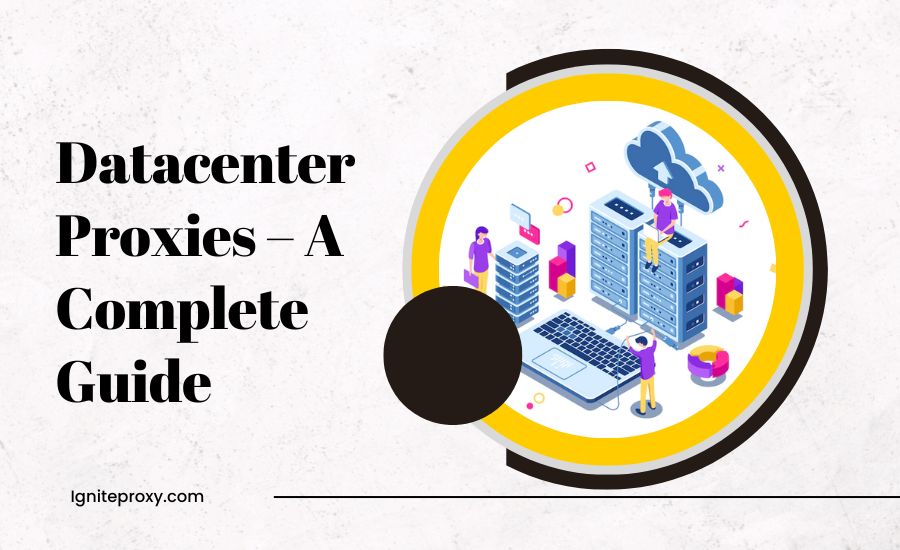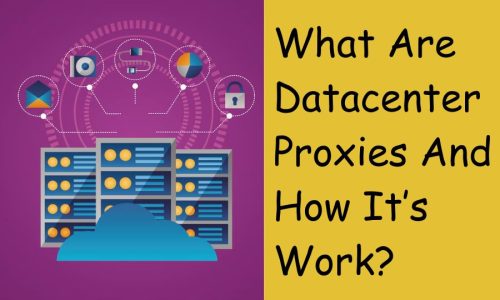A datacenter proxy is a type of proxy server that is hosted in a data center. It acts as an intermediary between a client (such as a web browser) and a server (such as a website). The client sends a request to the proxy server, which then forwards the request to the server and returns the server’s response to the client.
So in this article, we’ll discuss the complete guide to datacenter proxies, what they are, how they work, their advantages and disadvantages, and their use cases.
What Are Datacenter Proxies?
Proxies for datacenters are IP addresses that are not associated with any Internet Service Provider (ISP). Their IP addresses are obtained from datacenter servers owned by web hosting companies such as Amazon Web Services (AWS).
What are the types of datacenter proxies?
There are several types of datacenter proxies, including:
1. Shared proxies
These are proxies are shared among multiple users. They are usually less expensive than dedicated proxies, but they may be slower and less reliable.
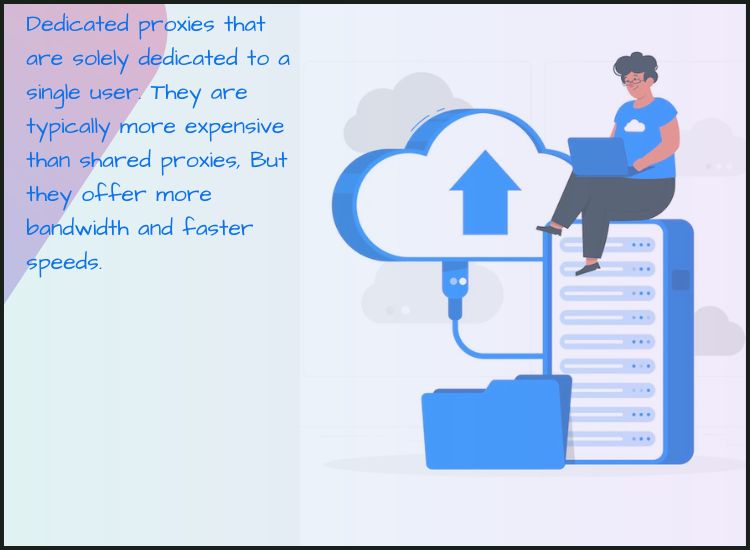
2. Dedicated proxies
These are proxies that are dedicated to a single user. They are typically more expensive than shared proxies, But they offer more bandwidth and faster speeds.
3. Private proxies
These are proxies that are only accessible to a specific group of users. They offer more privacy and security than shared or dedicated proxies.
4. Rotating proxies
These are proxies that automatically change the IP address they use for each request. They are used to avoid IP bans and improve anonymity.
5. Backconnect Proxies
These are proxies connected to a central server, This proxy allows the user to change the IP address they use without having too many configure the proxy settings.
6. Semi-dedicated proxies
These are proxies that are shared by a limited number of users, this can be used to balance the cost and performance of the proxy service.
It’s important to note that the type of proxy you choose will depend on your specific needs and use case. You should evaluate the different options available and choose the one that best fits your requirements.
How Do Datacenter Proxies Work?
Datacenter proxies work by routing client requests through a proxy server that is hosted in a data center. The client sends a request to the proxy server, which then forwards the request to the intended server (such as a website), and returns the server’s response back to the client.
Here is a step-by-step explanation of how datacenter proxies work:
Step 1: The client (such as a web browser) sends a request to access a website or web-based application.
Step 2: The request is first sent to the datacenter proxy server.
Step 3: The proxy server then forwards the request to the intended server (such as the website or application).
Step 4: The server processes the request and sends a response back to the proxy server.
Step 5: The proxy server then forwards the response back to the client.
Step 6: The client receives the response and can access the requested website or web-based application.
It’s important to note that datacenter proxies can be configured to add or remove certain types of information from the requests and responses, This can be used to filter content, improve performance, or protect the client’s anonymity.
Also, Datacenter proxies can be used to route traffic through different geographical locations, this can be useful for tasks such as bypassing geographical restrictions or testing a website’s performance in different regions.
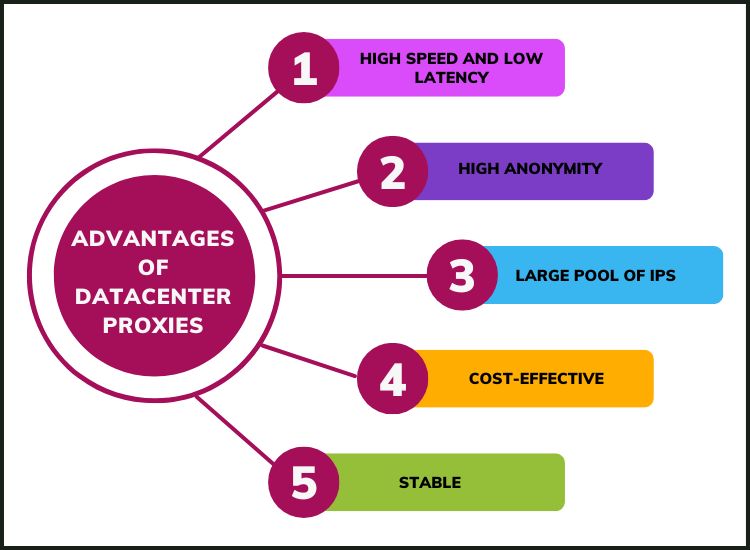
Advantages Of Datacenter Proxies
Datacenter proxies have several advantages, including:
1. High speed and low latency
Datacenter proxies are located in the same physical location as the target website, which results in faster connection speeds and lower latency.
2. High anonymity
Datacenter proxies are not associated with any specific individual or organization, making them more anonymous than residential proxies.
3. Large pool of IPs
Private datacenter proxies are often provided by large companies that have access to a large pool of IP addresses, allowing for more flexible and diverse use cases.
4. Cost-effective
Datacenter proxies are typically less expensive than residential proxies, making them a cost-effective option for businesses and individuals who need to use proxies on a regular basis.
5. Stable
Datacenter proxies are more stable than residential proxies, which are more likely to be blacklisted or blocked.
Largely used for scraping and scraping-related tasks, crawling, SEO, and marketing automation.
Disadvantages Of Datacenter Proxies
Datacenter proxies also have some disadvantages, a few of which are:
1. Cost
Datacenter proxies can be expensive compared to other proxy types.
2. Speed
They can slow down the internet connection due to the distance between the user and the server.
3. Blocked by websites
Some websites can detect and block datacenter proxies, making it difficult to access certain content.
4. Not anonymous
Datacenter proxies are not completely anonymous, as they can still reveal the user’s IP address.
5. Limited use cases
Datacenter proxies have limited use cases, such as scraping, automated bots, and mass data collection.
6. Lack of security
Datacenter proxies can be vulnerable to hacking and cyberattacks, putting the user’s data at risk.
7. Maintenance
Datacenter proxies require regular maintenance and updates to ensure they are working properly.
Use Cases For Datacenter Proxies
The best use cases for datacenter proxies are given below:
1. Web scraping and data extraction
Buy datacenter proxies that can be used to scrape websites and extract large amounts of data for business or research purposes.
2. Online advertising
Datacenter proxies can help businesses rotate their IP addresses to avoid being blocked by websites and bypass geographical restrictions
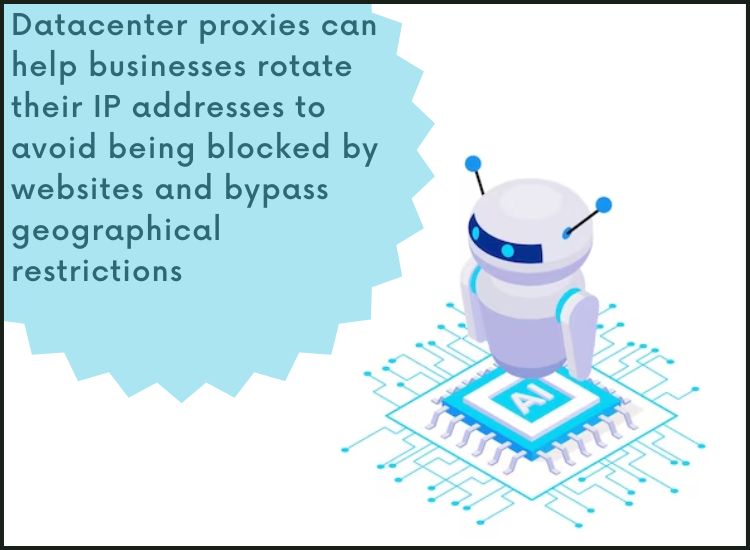
3. Automated bots
Datacenter proxies can be used to run automated bots for tasks such as account creation, price monitoring, and market research.
4. Mass data collection
Our cheap datacenter proxies can be used to collect large amounts of data from various sources, such as social media and e-commerce websites.
5. SEO and competitor analysis
Datacenter proxies can help businesses analyze their competitors’ websites, monitor their rankings, and improve their own search engine optimization.
6. IP rotation
Datacenter proxies can be used to rotate IP addresses, allowing users to bypass geographical restrictions and protect their online privacy.
7. Gaming
Shared datacenter proxies can be used to play online games from different regions, access restricted content, and avoid being banned from gaming platforms.
Conclusion
In conclusion, datacenter proxies are a type of proxy server that is located in datacenters and are commonly used for various purposes, such as web scraping, online advertising, and IP rotation.
While they offer many benefits, such as increased speed and flexibility, they also have their disadvantages, including cost, security risks, and the potential to be blocked by websites. It’s important to weigh the advantages and disadvantages and determine if a datacenter proxy is a right choice for your specific use case.
It’s also essential to choose a reputable and reliable proxy provider like proxiesforrent to ensure the highest quality of service and security of your data.
FAQ
1. What is a Transparent Proxy?
A transparent proxy, also known as an inline proxy, intercepting proxy, or forced proxy, is a server that detects a user’s or device’s connection to the internet.
2. Is it safe to use shared proxies?
Yes, if they come from a reputable proxy provider like proxiesforrent are safe. We will ensure your safety while browsing with shared proxies.
3. What is datacenter proxy?
A datacenter proxy is a proxy service that provides faster internet access and a more pleasant user experience. They will conceal your real IP address because they are not associated with an ISP.
4. What are the different types of proxies?
1. Datacenter proxy.
2. Dedicated proxy.
3. Private proxy.
4. Shared proxy.
